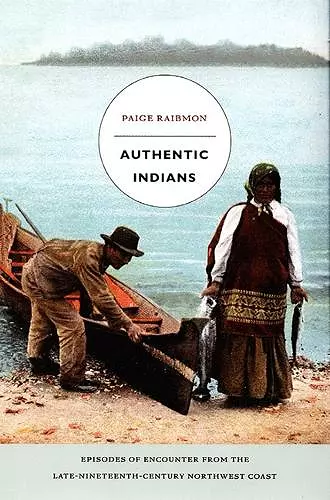Authentic Indians
Episodes of Encounter from the Late-Nineteenth-Century Northwest Coast
Format:Hardback
Publisher:Duke University Press
Published:21st Jul '05
Currently unavailable, and unfortunately no date known when it will be back

Analyzes cultural adaptation among aboriginal people in the Pacific Northwest, tracing the colonial origins and political implications of ideas about native "authenticity."
In this innovative history, Paige Raibmon examines the political ramifications of ideas about “real Indians.” Focusing on the Northwest Coast in the late nineteenth century and early twentieth, she describes how government officials, missionaries, anthropologists, reformers, settlers, and tourists developed definitions of Indian authenticity based on such binaries as Indian versus White, traditional versus modern, and uncivilized versus civilized. They recognized as authentic only those expressions of “Indianness” that conformed to their limited definitions and reflected their sense of colonial legitimacy and racial superiority. Raibmon shows that Whites and Aboriginals were collaborators—albeit unequal ones—in the politics of authenticity. Non-Aboriginal people employed definitions of Indian culture that limited Aboriginal claims to resources, land, and sovereignty, while Aboriginals utilized those same definitions to access the social, political, and economic means necessary for their survival under colonialism.
Drawing on research in newspapers, magazines, agency and missionary records, memoirs, and diaries, Raibmon combines cultural and labor history. She looks at three historical episodes: the participation of a group of Kwakwaka’wakw from Vancouver in the 1893 World’s Columbian Exposition in Chicago; the work of migrant Aboriginal laborers in the hop fields of Puget Sound; and the legal efforts of Tlingit artist Rudolph Walton to have his mixed-race step-children admitted to the white public school in Sitka, Alaska. Together these episodes reveal the consequences of outsiders’ attempts to define authentic Aboriginal culture. Raibmon argues that Aboriginal culture is much more than the reproduction of rituals; it also lies in the means by which Aboriginal people generate new and meaningful ways of identifying their place in a changing modern environment.
“There are not enough superlatives in a thesaurus to convey my enthusiasm for this book. It is insightful, original, intelligent, thoroughly researched, beautifully written, and more. Paige Raibmon is the first scholar working in Native history to dissect and articulate the connections between assimilationist government policies, the rise of North American anthropology, and tourism, all of which—Raibmon argues with great success—served as agents of colonialism.”—Nancy Shoemaker, author of A Strange Likeness: Becoming Red and White in Eighteenth-Century North America
“There is nothing in the existing historical literature that accomplishes what this book does. It vividly depicts the interplay of ideas, strategies, and practical considerations during a period that has had significant and long-lasting impacts on everyone’s ideas about ‘Indianness.’ Admirably, Paige Raibmon insists that we consider non-Indians’ ideas in relationship to Indians’ ideas and strategies, something few existing works do.”—Alexandra Harmon, author of Indians in the Making: Ethnic Relations and Indian Identities around Puget Sound
“Authentic Indians is a masterful work that carefully weaves together a complicated theoretical argument with a lively historical narrative. Raibmon paints a clear picture of cultural and economic power structures that ruled the indigenous peoples of the Northwest Coast. And, through an innovative reading of a diverse array of primary sources, she finds native voices and tells a story that features indigenous peoples as meaningful historical actors.” -- Colleen O’Neill * Labor *
ISBN: 9780822335351
Dimensions: unknown
Weight: 612g
328 pages